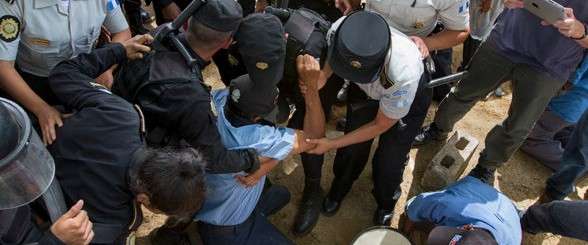For Immediate Release
August 17, 2012
WASHINGTON, D.C.—In the wake of tragic violence at the Marikana platinum mine in South Africa this week, the Center for International Environmental Law is calling on the World Bank to revisit its investment in the company that operates the mine.
The World Bank Group owns at least $15 million USD worth of shares in Lonmin, the British operator of the mine, where at least 34 mine workers were killed yesterday by the country’s police force and where two policemen were slain earlier in the week.
In 2006, the International Finance Corporation—the private sector lending arm of the World Bank—approved the investment in Lonmin, which consisted of access to a $100 million USD loan, an initial equity investment of $15 million USD with an option to invest up to $35 million within the first year of the deal. In addition to seeking a full investigation into the violence and what led to it, CIEL has called on World Bank President, Jim Yong Kim, to revisit the Bank’s investment in this project in light of recent events, specifically, and its approach to lending in the extractive industries more generally.
“Our hearts go out to the community and to the people of South Africa in the face of this national tragedy,” said Kristen Genovese, Director of CIEL’s Law and Communities Program. “And we urge the World Bank to recognize this as a wake up call on the profound risks of mining investments. ”
The mine has had a troubled history with the communities and its workers. A stakeholder perception survey commissioned by Lonmin in 2005 shortly after it acquired the mine and before IFC’s investment showed that most respondents regarded the mine with “negativity combined with mistrust, suspicion and in some cases hatred.” In fact, the conflict between the unions, which is thought to have sparked the violence this week, was visible even seven years ago. The survey reported a history of mistrust between all three unions. Participants reported union favoritism and discrimination at the mine and urged Lonmin to “treat people equally, regardless of race, job level or union affiliation.”
“Conflict like this doesn’t erupt overnight,” said Genovese. “Too often investors overlook the complexities of projects like the Marikana mine and miss the warning signs that could have prevented tragedy.”
Despite criticism from communities and NGOs that industrial mining projects often result in serious human rights violations and little economic development, the IFC continues to justify its investments as a “key source of jobs, economic opportunities, investments, revenues to government, energy and other benefits for local economies.” In documents disclosed on the Lonmin deal, IFC asserted that, “This investment is expected to have beneficial results for the workforce and surrounding communities.” Indeed, IFC documents state that Lonmin “supports the protection of human life and dignity within their sphere of influence by subscribing to the principles laid down in the United Nation’s Declaration of Human Rights.” And yet despite attesting to a close working relationship with the South African police force on matters of security, a statement made yesterday by Lonmin chairman Roger Phillimore characterized the violence as “clearly a public order rather than a labor relations associated matter.”
Media Contact:
Amanda Kistler, akistler@ciel.org, +1 202-742-5832
About CIEL
Founded in 1989, the Center for International Environmental Law (CIEL), www.ciel.org, uses the power of law to protect the environment, promote human rights and ensure a just and sustainable society. With offices in Washington, DC and Geneva, CIEL’s staff of international attorneys and experts work in the areas of human rights and the environment, climate change, law and communities, chemicals, trade and the environment, international environmental governance, biodiversity and international financial institutions by providing legal counsel and advocacy, policy research and capacity building.
